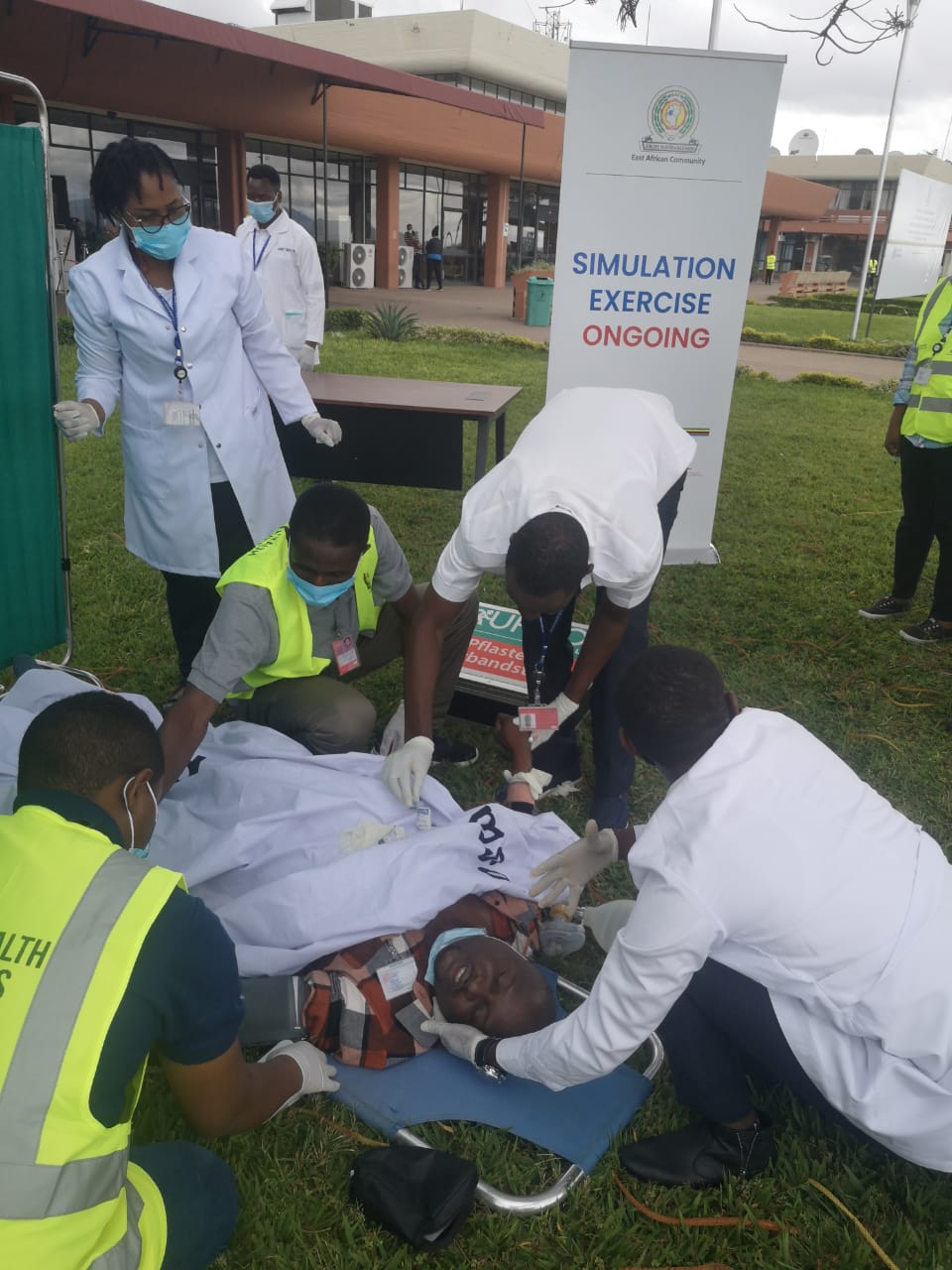
East African Community steps up readiness for health emergency response
East African Community Headquarters, Arusha, Tanzania, 6 May 2022: The East African Community Secretariat today held the first simulation exercise (SIMEX) since the onset of COVID-19 pandemic in order to strengthen preparedness and bolster response to future public health emergencies in the Partner States.
The exercise is part of a one-week regional training workshop to strengthen national capacities for exercise operations at ports of entry and is a follow up on Table Top exercise conducted in Arusha in 2018 and the cross-border field simulation exercise at the Namanga border between Kenya and Tanzania in June 2019.
The simulation exercise, taking place at Kilimanjaro International Airport in the United Republic of Tanzania, is intended to test the knowledge and skills acquired by the participants during the training workshop. The aim of the exercise is to link early warning with preparedness and response. The logistics drill includes a realistic disaster scenario which will help the participants to build skills for design and implementation of simulation exercises at national level.
Kilimanjaro International Airport Security Manager, Justine Makomondi Kisusi, confirmed that the exercise is necessary for strengthening readiness to respond to public health emergencies: “We are delighted to receive all delegates for this emergency simulation exercise, as it will help us combat future outbreaks”.
In addition to the COVID-19 pandemic, in recent years, the East African Community (EAC) has experienced numerous outbreaks of infectious diseases and other events of public health concern, such as droughts and floods. In the African Region, about 100 public health events are reported annually. In the last three years, East Africa has had several disease outbreaks such as yellow fever, cholera, Rift Valley fever, Marburg virus disease, measles and Ebola. The region is also prone to natural disasters such floods, landslides and drought. The outbreak of COVID-19 pandemic reinforced the need to enhance public health emergency capacities at ports of entry.
To better prepare for public health emergencies, the EAC Secretariat, with support of WHO and the Deutsche Gesellschaft für Internationale Zusammenarbeit (GIZ) GmbH, conducted a training of 60 emergency response experts and officials from Burundi, Kenya, South Sudan, Tanzania and Uganda on management of public health emergencies at ports of entry. The participants were selected from various One Health sectors including health, environment, agriculture and animal heath, trade, tourism and defence.
Speaking during the opening ceremony, Dr David Balikowa from the East African Community noted that it is critical to keep “assessing and improving the regional health crisis response capacity and status of implementation of the International Health Regulations”. Dr Mary Stephen, the WHO Regional Office for Africa Focal Point for International Health Regulations reminded participants of the increasing occurrence of emerging and re-emerging diseases which present immense challenges to detect and contain. The Manager of the EAC/GIZ Support to Pandemic Preparedness in the EAC Region project in Arusha, Tanzania, Dr Irene Lukassowitz, agrees on the need to be prepared for future outbreaks, as “fighting for more resilient health systems can also help withstanding the shock if disaster and potential damage from emergencies”.
For more information, please contact:
Simon Peter Owaka
Senior Public Relations Officer
Corporate Communications and Public Affairs Department
EAC Secretariat
Arusha, Tanzania
Tel: +255 768 552087
Email: sowaka [at] eachq.org
About the East African Community Secretariat:
The East African Community (EAC) is a regional intergovernmental organisation of six Partner States, comprising Burundi, Kenya, Rwanda, South Sudan, Tanzania and Uganda, with its headquarters in Arusha, Tanzania.
The EAC Secretariat is ISO 9001: 2015 Certified
Tags: Panprep
